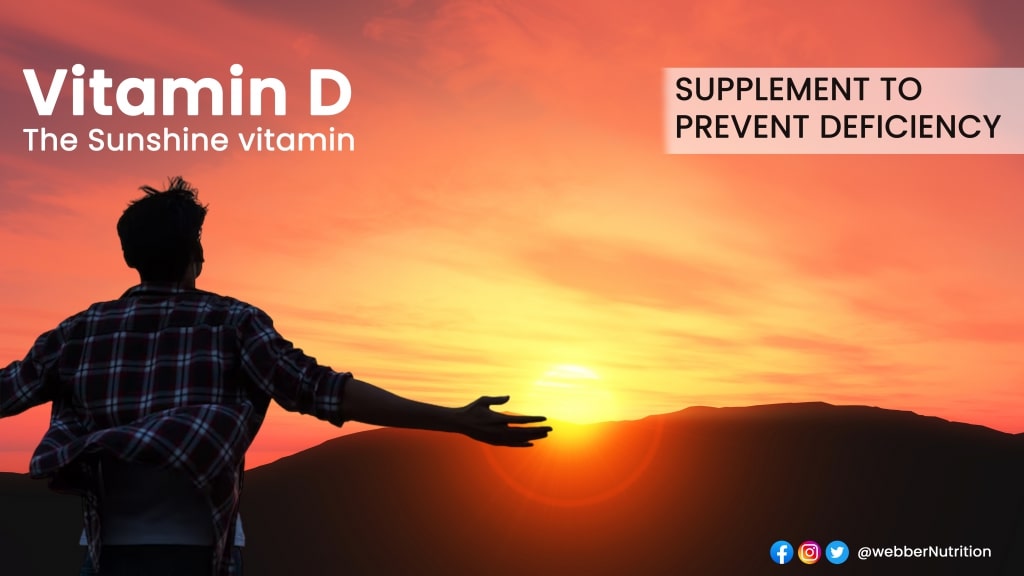If you’re unaware of the important roles the sunshine vitamin/vitamin D plays in the body, hopefully, this will give you an insight into how and why you should avoid vitamin D deficiency.
What Is The Sunshine Vitamin/Vitamin D?
Vitamin D is a pro-hormone that is primarily obtained from direct sunlight exposure to the skin (vitamin D3). It can also be obtained through certain foods (oily fish, mushrooms, fortified dairy & cereals) but this alone does not provide the body with enough vitamin D for normal physiological functions. Remember, the use of sunscreen with a protection factor of 30 will block 95% of the vitamin D synthesis in the skin.
⠀ During winter months we are deprived of sunshine, meaning people are likely to be deficient in vitamin D. Therefore the best way to maintain vitamin D levels is through supplementation. A safe and effective dosage is 1,000-4,000IU per day (upper limit for athletes and individuals with a severe deficiency).
I recommend you check your vitamin D levels before taking vitamin D supplements to determine what dosage is best for you. You should be able to get this done at your GP.
How Long Does Your Body Store Vitamin D?
Vitamin D/sunshine vitamin can be produced in the skin upon direct exposure to the sun. The half-life, the time it takes for orally consumed vitamin D to be excreted by the body, is 15 days.
Based on this, approx. 25% of the vitamin D consumed orally remains in the body 30 days later. However, this can vary based on the dose of vitamin D intake, the body’s fat content, and the health of the body, which can vary greatly between individuals. This makes It difficult to distinguish how long vitamin D is stored in the body.
Sources of Vitamin D
The human body is capable of producing vitamin D when it is exposed to the Sun. But if your exposure to sunlight is limited i.e. during winter months, you are likely to have vitamin D deficiency.
During winter months, and if your sunlight exposure in general is very low because you work indoors for long daytime hours or wear clothes that cover the skin for religious reasons, then a daily 1,000-4,000IU vitamin D3 supplement is recommended.
Some foods contain small amounts of vitamin D but alone these are unlikely to prevent vitamin D deficiency, such as;
- Cod liver oil
- Salmon
- Tuna fish
- Mushrooms
- Orange juice
- Dairy and plant milk
- Beef liver
- Egg Yolk
Vitamin D Benefits
Vitamin D is a fat-soluble compound that helps strengthen muscles, bones, and teeth. It also strengthens the body’s immune system, reducing inflammation. It may help reduce the risk of type 1 & 2 diabetes, hypertension, and may even help with weight loss.
Promotes calcium homeostasis for bone health
Muscle function & strength
Immune function
Weight management/fat loss
Glucose & insulin sensitivity
Vitamin D Deficiency, Why It Happens, and Its Consequences?
Vitamin D deficiency arises if the body can not produce sufficient vitamin D because of a lack of direct sunlight exposure, and without supplementing or including sufficient dietary sources. Vitamin D deficiency can lead to loss of bone density which can contribute to fractures.
With severe vitamin D deficiency, a disease called Rickets, which is the softening of the bones, could occur. A lack of vitamin D may also make you susceptible to depression.
Alternatively, consuming excessive vitamin D can also produce side effects such as nausea, vomiting, constipation, and weakness, however, doses are extremely high and very rare. Below are the consequences that may happen due to the lack of sunshine vitamin.
Poor bone health
Muscle wasting
Diabetes
Weight gain
Cancer
Rheumatoid arthritis
Multiple sclerosis
Illness, injury & falls
Why Does it Happen?
Vitamin D deficiency can be caused due to the following reasons:
- Less exposure to the sun
- Poor consumption of vitamin D-rich food
- Not taking a vitamin D3 supplement
- The liver and kidney can not convert vitamin D to its active form in the body
- Medications that prevent the body from converting vitamin D
Who is Most Susceptible to Vitamin D Deficiency?
Elderly ⠀
Darker skinned individuals⠀
Indoor sport athletes⠀
Office/indoor-based job workers
Key Take Home Messages:
If you’re susceptible to vitamin D deficiency, get tested and supplement over the winter months. 4,000IU is the recommended upper limit vitamin D3 dosage for athletes and should be batch tested (Informed-Sport certified).
Recommended Product: 2,000IU/day. With 20% discount code – 20NX. https://www.nutritionx.co.uk/vitamin-d3-tablets
FAQs
Whom does Vitamin D deficiency affect the most?
People with darker skin, elderly citizens, indoor sportsmen, and indoor job workers are the ones who are most affected by vitamin D deficiency.
How to get enough vitamin D?
Exposure to sunlight. Human skin can produce vitamin D when exposed to sunlight. However, it’s not enough. Eating food like olive oil, lemon, unsalted butter, packaged tuna, and Herring fish can satisfy your body’s need for vitamin D.
How long does your body store vitamin D?
Vitamin D is a fat-soluble micronutrient, therefore can be stored in the liver and the fat tissue of the body for several months. However, this is dependent on the dose of the vitamin D intake, the body’s fat content, and the health of the body, which can vary greatly between individuals. This makes It difficult to distinguish how long vitamin D is stored in the body, but vitamin D taken orally could be measured. The half-life, the time it takes for orally consumed vitamin D to be excreted by the body, is 15 days. Based on this, approx. 25% of the vitamin D consumed orally remains in the body 30 days later.






